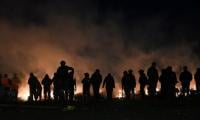Russia suspends military hotline with US
America downs Syrian aircraft
MOSCOW: Russia on Monday condemned the American military’s downing of a Syrian warplane, suspending the use of a military hotline that Washington and Moscow have used to avoid collisions in Syrian airspace and threatening to target aircraft flown by the United States and its allies over Syria, The New York Times reported.
The moves were the most recent example of an intensifying clash of words and interests between the two powers, which support different sides in the years-long war in Syria. The Russian military has threatened to halt its use
of the hotline in the past — notably after President Trump ordered the launch of missiles against a Syrian airbase in April — only to continue and even expand its contacts with the United States military. It was not clear whether the latest suspension would be lasting.
Its announcement came in response to an American F/A-18 jet’s shooting down a Syrian government warplane south of the town of Tabqah on Sunday, after the Syrian aircraft dropped bombs near local ground forces supported by the United States. It was the first time the American military had downed a Syrian plane since the civil war began in the country in 2011.
The Russian defence ministry called American attacks against the Syrian forces “military aggression” and announced that it would suspend cooperation with the United States intended to prevent airborne accidents over Syria.
“All flying objects, including planes and drones of the international coalition, detected west of the Euphrates, will be followed by Russian air defence systems as targets,” the Russian defence ministry said in a statement.
The United States will continue to conduct air operations over Syria, a spokesman for the American-led task force that is fighting the Islamic State said on Monday.
“We are going to continue to conduct operations throughout Syria, providing air support for coalition and partnered forces on the ground,” the spokesman, Col Ryan Dillon, said in a telephone interview from Baghdad. But Pentagon officials emphasised that the situation was still unfolding.
“This is a delicate couple of hours,” Gen Joseph F Dunford Jr, the chairman of the Joint Chiefs of Staff, said on Monday just before speaking at a luncheon at the National Press Club in Washington. He said that he had no plans to immediately call his Russian counterpart, Gen Valery V Gerasimov, while the American military was still determining facts on the ground, but that he would talk to him “in time.”
During his appearance at the press club, General Dunford said that the hotline had been used on Monday morning, and added that the United States would work both diplomatically and militarily in the coming hours “to re-establish deconfliction.”
Colonel Dillon did not provide details on what air operations were underway. After the United States carried out the cruise missile attack in April at a Syrian airfield that was used to mount a nerve-gas attack, the American-led air war command initially sent armed drones in and around Raqqa instead of piloted aircraft. That was done to guard against the risk of retaliation by Syrian and Russian air defences.
Weeks after President Vladimir Putin of Russia ordered his country’s military forces to Syria in September 2015 to prop up the government of President Bashar al-Assad, Russia and the United States signed a memorandum on preventing air clashes between the two countries.
Since then, the agreement has been a crucial link that has allowed Moscow and Washington to notify each other about their air operations over Syria, in which Iran, Israel, Russia, Syria, Turkey and the United States with its allies carry out attacks in pursuit of often-competing aims. But Moscow has tried to use the agreement as leverage each time the situation has threatened to escalate.
The Russians threatened to stop using the hotline after the April cruise missile strike. But by the next month, the two sides were using it more than ever. Colonel Dillon said the American-led coalition was also prepared to continue using the hotline, which consists of phone calls between the United States’ Al Udeid Air Base in Qatar and a Russian base at Latakia, Syria. An unclassified Gmail account is used as a backup.
“The coalition is always available to deconflict with Russia to ensure the safety of our aircrews and operations,” Colonel Dillon said. Speaking in Beijing on Monday, the Russian foreign minister, Sergey V Lavrov, seemed to be unaware of the decision. He called on the United States and all other countries involved in the Syria conflict to “coordinate their actions.”
“We urge everyone to avoid acting unilaterally, to respect the sovereignty of Syria,” he said. In Moscow, Frants Klintsevich, the deputy chairman of the Russian Senate’s defence committee, called the downing of the Syrian warplane a “blunt act of aggression and provocation.”
“It is Russia that is being provoked most of all,” Mr Klintsevich wrote in a Facebook post. “It seems that the United States under Donald Trump is the source of danger for the Middle East and the whole world on a qualitatively new level.”
-
 'Bridgerton' Season 4: Showrunner Talks About Violet's Steamy Romance
'Bridgerton' Season 4: Showrunner Talks About Violet's Steamy Romance -
 John Tesh Recalls ‘uncomfortable’ Backlash Over ’70s Romance With Oprah Winfrey
John Tesh Recalls ‘uncomfortable’ Backlash Over ’70s Romance With Oprah Winfrey -
 Meghan Markle, Prince Harry Problem Was Not ‘work’ During Time With Royals
Meghan Markle, Prince Harry Problem Was Not ‘work’ During Time With Royals -
 Meta Strikes Multi-billion-dollar AI Chip Deal With Google: Will The New Collaboration Pay Off?
Meta Strikes Multi-billion-dollar AI Chip Deal With Google: Will The New Collaboration Pay Off? -
 Gracie Abrams Breaks Silence After Losing 2026 BRIT Award
Gracie Abrams Breaks Silence After Losing 2026 BRIT Award -
 Deon Cole Takes Swipe At Nicki Minaj In Mock Prayer During NAACP Image Awards Monologue
Deon Cole Takes Swipe At Nicki Minaj In Mock Prayer During NAACP Image Awards Monologue -
 Jennifer Garner Reveals The Actress Who 'carried Through Things'
Jennifer Garner Reveals The Actress Who 'carried Through Things' -
 Shamed Andrew ‘awful’ Time As Trade Envoy Is Laid Bare By Insider
Shamed Andrew ‘awful’ Time As Trade Envoy Is Laid Bare By Insider -
 Belgium Seizes Suspected Russian Shadow Fleet Tanker
Belgium Seizes Suspected Russian Shadow Fleet Tanker -
 Liza Minelli Makes Bombshell Claim About Late Mother Judy Garland’s Struggle With Drugs
Liza Minelli Makes Bombshell Claim About Late Mother Judy Garland’s Struggle With Drugs -
 Shipping Giant Maersk Halts Suez Canal, Bab El-Mandeb Sailings Amid Escalating Conflict
Shipping Giant Maersk Halts Suez Canal, Bab El-Mandeb Sailings Amid Escalating Conflict -
 Matthew McCoughaney Reveals One 'gift' He Achieved With Losing Nearly 50 Pounds
Matthew McCoughaney Reveals One 'gift' He Achieved With Losing Nearly 50 Pounds -
 'Scream 7' Breaks Box Office Record Of Slasher Franchise: 'We Are Grateful'
'Scream 7' Breaks Box Office Record Of Slasher Franchise: 'We Are Grateful' -
 Bolivian Military Plane Crash Death Toll Rises To 20
Bolivian Military Plane Crash Death Toll Rises To 20 -
 'Sinners' Star Blasts Major Media Company For 2026 BAFTAs Incident
'Sinners' Star Blasts Major Media Company For 2026 BAFTAs Incident -
 Inside Scooter Braun, Sydney Sweeney's Plans To Settle Down, Have A Baby
Inside Scooter Braun, Sydney Sweeney's Plans To Settle Down, Have A Baby



